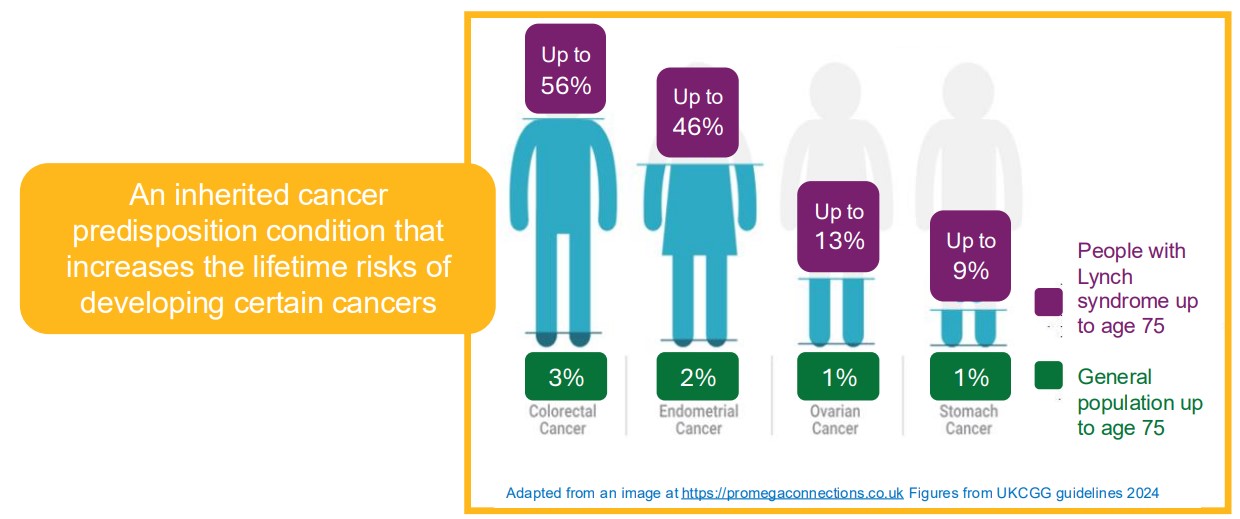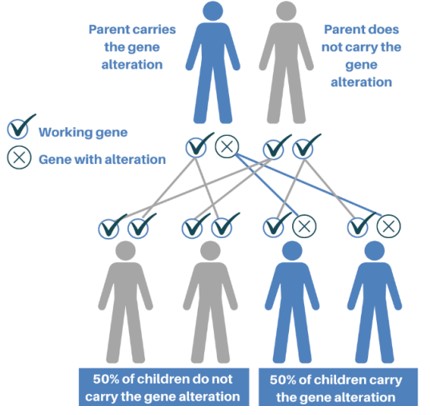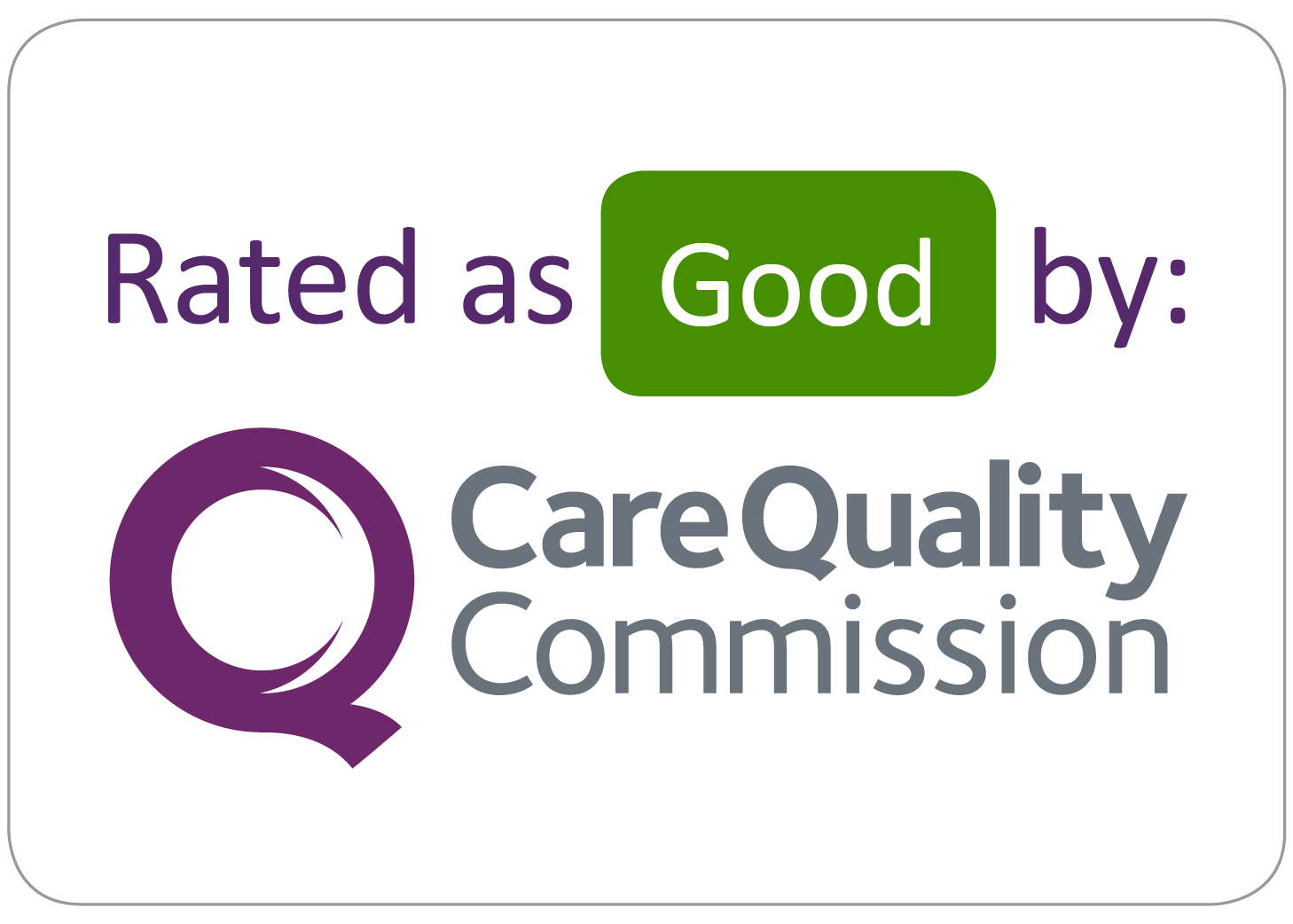Lynch Syndrome

What is Lynch Syndrome?
Lynch syndrome is a condition that can run in families and can increase the risk of developing some cancers. It is estimated that 1 in 400 people in England have Lynch syndrome (equivalent to around 175,000 people), but just 5% are aware they are living with the condition.
People with Lynch syndrome often get cancer before age 50. It is an inherited condition that increases the risk of certain cancers; including bowel, ovarian and pancreatic and people should undergo lifelong cancer screenings to detect and treat cancer early.
Karen Westaway Project Manager from the West Yorkshire Cancer Alliance gives you some of the facts and figures that might help you better understand the condition.
Video courtesy of Caroline Salt at Airedale General Hospital NHS Foundation Trust and Michelle Ratcliffe at Bradford Teaching Hospitals NHS Foundation Trust
How is Lynch syndrome diagnosed?
There are variants in different genes that can cause lynch syndrome and your risk of certain cancers depends on the variant you have.
A genetics specialist will explain:
- what your genetic test shows
- how this affects your risk of each cancer
- how this may affect other people in your family.

Lynch syndrome is usually diagnosed by genetic testing; when a sample of cancer cells from someone in the family affected by cancer is tested first. You may be offered a genetic test for the following reasons:
- You or a family member has been diagnosed with bowel or womb cancer
- The pattern of cancers in your family may suggest Lynch syndrome
If you are worried about the pattern of cancer in your family, talk to your GP. If needed, they will refer you to a genetics specialist.
People affected by lynch syndrome have a higher risk of developing:
- colon cancer
- rectal cancer
- womb (endometrial cancer)
- ovarian cancer
- stomach cancer
- pancreatic cancer
- small bowel cancer
- ureter and renal pelvis cancer.
Lynch syndrome is typically inherited in an autosomal dominant pattern, which means one copy of the altered gene in each cell is sufficient to increase the risk of cancer. Although people with Lynch syndrome have a higher risk of cancer, not all people with Lynch syndrome will develop cancer.
Screening uses tests to find cancer at an early stage, when it can be treated most effectively. It also helps to find and treat changes that are likely to develop into cancer.
It is important to keep having screening, unless genetic testing shows you do not have the gene variant that affects other people in your family.
Cancer nurse specialists in this video explain the testing process and reassure you about the options you have and the time you can take in deciding what’s right for you.
Video courtesy of Caroline Salt at Airedale General Hospital NHS Foundation Trust and Michelle Ratcliffe at Bradford Teaching Hospitals NHS Foundation Trust
Genomics and Cancer
Cancer is a disease of the genome. It is caused by changed to DNA that occur over a person's lifetime, though around 5% of cancers have an inherited component.
Genomics in cancer deals with variants in two different genomes:
Germline variants = Patient genome
Somatic variants = Tumour genome.
This brief video from health education england gives an explantion of how genomics is used in cancer care.
How is genomics used in cancer care?
The genetic counselling service
Genetic counsellors provide support post-diagnosis, discussing management options and family implications. The service addresses genetic conditions and their family impacts. Patients can undergo blood or biopsy tests, with blood tests confirming Lynch syndrome.
In this video Kathryn explains her role as a genetic counsellor in Yorkshire.
Video courtesy of Caroline Salt at Airedale General Hospital NHS Foundation Trust and Michelle Ratcliffe at Bradford Teaching Hospitals NHS Foundation Trust
How to reduce risks of cancer with Lynch Syndrome
Some of the general screening recommendations and cancer prevention strategies for Lynch syndrome.
Your healthcare professional will explain and go through your personalised cancer prevention programme with you in more detail.
If you have any questions, get in touch with your healthcare team.
- Consider taking aspirin (NICE guidelines 2020) from the age of 25 to 65 for cancer prevention. Aspirin has been shown to reduce the long term risk of cancer in Lynch syndrome by around 50%. If you are younger than 25 and you wish to start taking aspirin, discuss this with your medical team.
- One-off screening for Helicobacter pylori: eradication of these bacteria may reduce the lifetime risk of gastric cancer by half. To arrange testing for this contact your GP.
- General lifestyle recommendations:
- Healthy diet: High fibre, low fat, with plenty of fruit and vegetables. T
- Behaviours: Limiting your alcohol intake, not smoking, and doing regular exercise is beneficial for your general health and all have a role in preventing the development of cancer.
- Body weight: Maintaining a healthy body weight is also important.
- Two-yearly check-up of your bowel: For colorectal cancer prevention - the national Bowel Cancer Screening Programme now offers 2 yearly colonoscopies for all patients known to have Lynch syndrome
- Gynaecological surveillance: There are some surgical risk-reducing interventions which maybe discussed if appropriate for women between the ages of 40 and 45 who have completed their family. Please discuss this with your healthcare professional.
- To prevent or reduce the risk of developing other cancer types, such as skin cancer, we recommend symptom awareness and to remain vigilant. If you have a new symptom that lasts for over 2 weeks, it is recommended that you seek medical advice.
Additional support, information and useful resources

Not everyone with lynch syndrome develops cancer and it can be difficult to cope with the uncertainty of a higher cancer risk.
There may not always be clear answers and it is important to talk to your genetics specialist, doctor or nurse; they will be happy to answer any questions you have.
There are many people in the UK who live with Lynch syndrome. If you would like to meet other people living with Lynch syndrome, there are associations that can help you get in touch with useful resources, events, online as well as face-to-face support groups.
Please click the links below for more information
Lynch Syndrome UK is a UK charity that offers additional support and information for all people with Lynch Syndrome.
A beginner's guide to Lynch Syndrome - patient information provided by the Royal Marsden NHS Foundation Trust
Macmillan Cancer Support - patient information on Lynch syndrome
A guide to Lynch Syndrome - leading gynaecological cancer charity have produced a guide on lynch syndrome. This is also available in easy read.
Lynch Syndrome information for patients - Information provided by RM partners NW and SW London Cancer alliance developed for individuals who have recently been diagnosed with colorectal (bowel) or endometrial (womb) cancer and have been invited for a genetic assessment and possible genetic testing for Lynch syndrome.
Genetic testing for Lynch syndrome patient information by Leeds Teaching Hospitals for patients considering having testing.
Predictive genetic testing for Lynch syndrome booklet which can be downloaded as a PDF from the Yorkshire Regional Genetic Service.

















